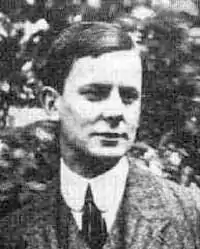
Ernst Stadler (11 August 1883 — 30 October 1914) was a German Expressionist poet. He was born in Colmar, Alsace-Lorraine and educated in Strasbourg and Oxford; in 1906 he was awarded a Rhodes Scholarship to study at Magdalen College, Oxford.[1]
His early verse was influenced by Stefan George and Charles Péguy, but after 1911, Stadler began developing a different style. His most important volume of poetry, Der Aufbruch, which appeared during 1914, is regarded as a major work of early Expressionism. The poems of Der Aufbruch are a celebration of the poet's joy in life and are written in long, free verse lines inspired by the example of Walt Whitman.[2]
Stadler was killed in battle at Zandvoorde near Ypres in the early months of World War I.[3]
Sources
- Ernst Stadler Der Aufbruch (ed. Heinze Rölleke, Reclam, 1967)
- Gedichte des Expressionismus (ed. Dietrich Bode, Reclam, 1966)
Notes
- ↑ Rollmann, Hans (1982). "Die Berufung Ernst Stadlers an die Universität Toronto: Eine Dokumentation". Seminar: A Journal of Germanic Studies. Vol. 18, no. 2. pp. 79–113.
- ↑ Rollmann, Hans (1985). "Ernst Stadler and Charles Péguy: The correspondence". Seminar: A Journal of Germanic Studies. Vol. 21, no. 3. pp. 253–271.
- ↑ Rollmann, Hans (1985). "The New Critical Stadler edition: Addenda to work, correspondence and bibliography". Seminar: A Journal of Germanic Studies. Vol. 21. pp. 286–302.
External links
- Works by Ernst Stadler at Project Gutenberg
- Works by or about Ernst Stadler at Internet Archive
- Ernst Stadler at Find a Grave